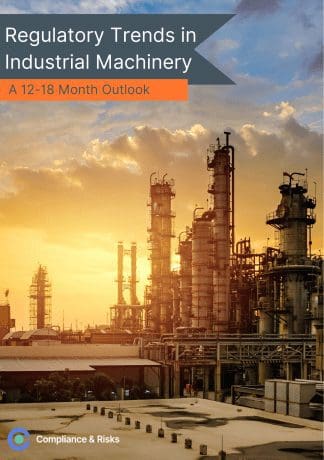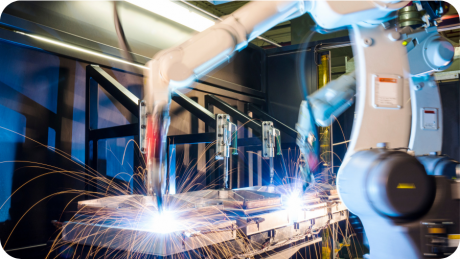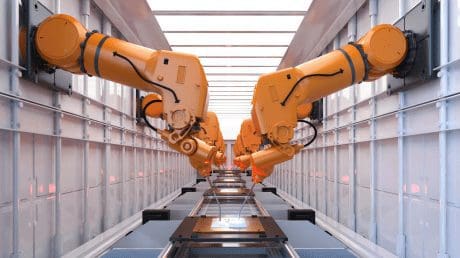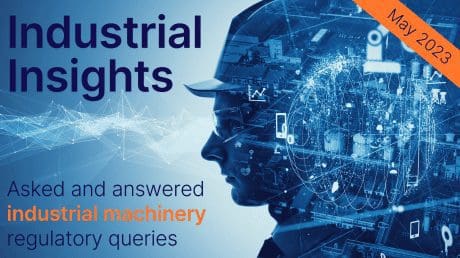
Industrial Insights: Top Industrial Machinery Queries – April 2023
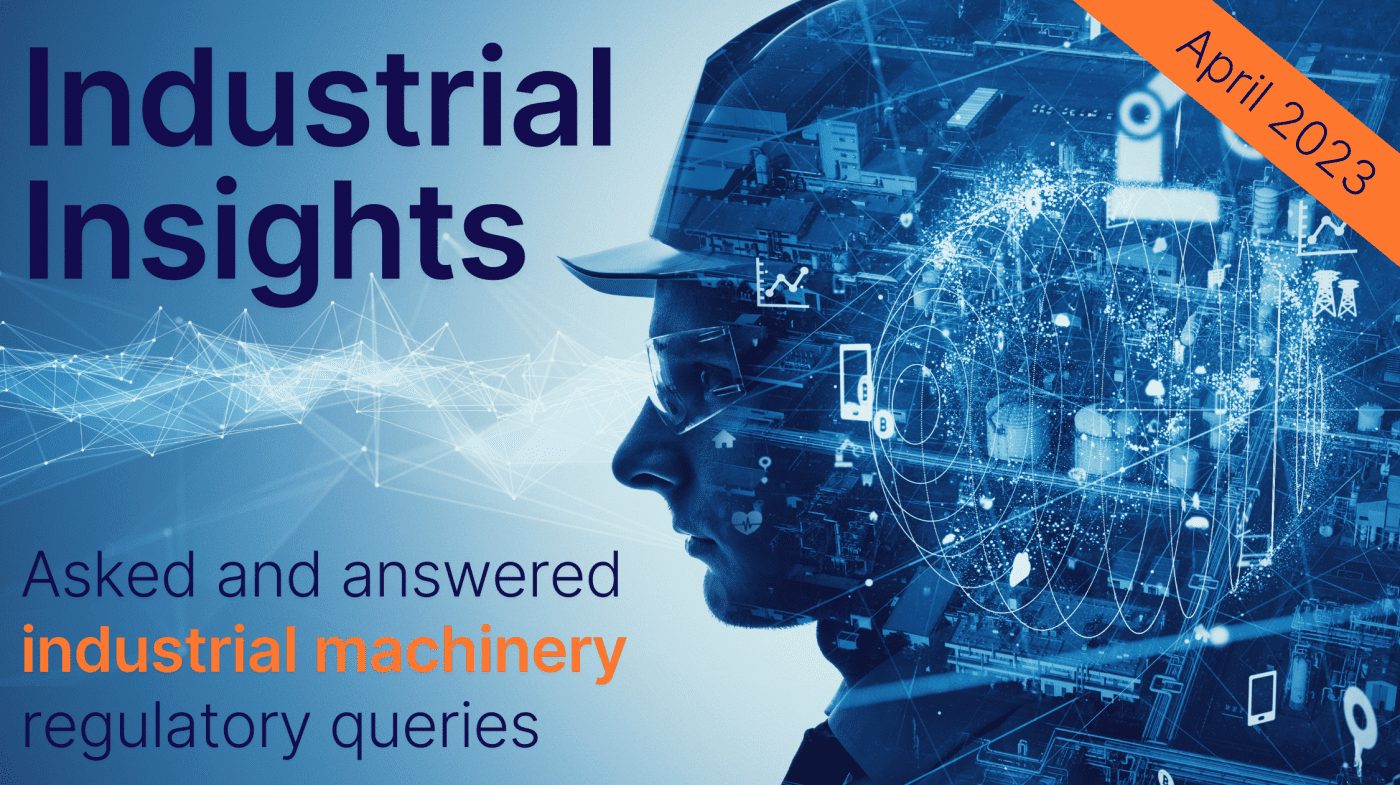
How do you stay ahead of regulatory changes in industrial machinery?
To help you maintain continuous market access, our monthly feature Industrial Insights gathers some of the most interesting recent queries around the industrial machinery regulatory landscape from Compliance & Risks customers.
Take a look at March’s top queries around the industrial machinery regulatory landscape!
April’s Top Queries
Question 1:
I understand that the CE marking must be followed by the identification number of the notified body if that notified body is involved in the production control phase (Article R12 of Decision No. 768/2008/EC) or if its involvement is required for the assessment of conformity (full quality assurance procedure referred to in Machinery directive Articles 12(3)(c) and 12(4)(b) according to Annex 3).
- However, which modules require the identification number of the notified body?
- What specific machinery or related products are referred to as units in Module G?
With regard to the first part of your question the full quality assurance procedure described in Annex X requires the identification number of the notified body.
The procedure provides manufacturers of Annex IV machinery with an additional method for assessing conformity.
During this procedure, rather than assessing an individual product, the notified body assesses the manufacturer’s quality assurance system for the design, manufacture, final inspection and testing of one or more machinery types in the categories listed in Annex IV.
On your second point, where you refer to Module G: Conformity based on unit verification as described in Decision No. 768/2008/EC, it is important to note that the applicable directive describes the modules that are allowed for conformity assessment.
There are a few directives and regulations that are not (yet) based on the common conformity assessment procedures, per Decision No. 768/2008/EC, and one of these is the machinery directive.
The machinery directive provides for the application of 3 conformity assessment procedures only, and so one of these should be selected:
- (a) the procedure for assessment of conformity with internal checks on the manufacture of machinery, provided for in Annex VIII;
- (b) the EC type-examination procedure provided for in Annex IX, plus the internal checks on the manufacture of machinery provided for in Annex VIII, point 3;
- (c) the full quality assurance procedure provided for in Annex X.
Question 2:
Does the F-Gas Regulation include industrial large scale equipment that contains refrigerant (such as large scale battery energy storage system)? The primary function of that energy storage system is not refrigeration, so it does not seem like it fits categories specified in the text (Article 4 Leak checks, etc.)
The Regulation covers all equipment containing F-gases including stationary and mobile refrigeration and air conditioning (AC) equipment.
Article 4(2) of Regulation 517/2014 is quite specific as regards the type of stationary equipment that contains f-gases which shall be subject to periodic leak checks. These are:
- (a) stationary refrigeration equipment
- (b) stationary air-conditioning equipment
- (c) stationary heat pumps
- (d) stationary fire protection equipment
- (e) refrigeration units of refrigerated trucks and trailers
- (f) electrical switchgear
- (g) organic Rankine cycles
The only derogation to the leakage check obligation that expired on 31 December 2016 was for equipment that contains less than 3 kg of F-gases or hermetically sealed equipment, which contains less than 6 kg of F-gases.
Question 3:
Are industrial products in scope of KC safety? I know that they are in scope of KCC EMC/Telecom, but I was previously told that they are out of scope of KC safety.
Products that can be used in homes, offices, farms, light industries and commercial areas are subject to KC safety certification/reporting under the Electrical Appliances and Consumer Products Safety Control Act.
Therefore, it is important to look at whether your product is listed, and what purpose it is used for.
Regarding exemptions from certification, etc., if a product to be used for industrial or other special purposes (limited to manufacturing/electrical companies), has been confirmed for exemption from the Korea Product Safety Management Institute, it may be exempted from KC certification/reporting.
Also, Article 6 of the Electrical Appliances and Consumer Products Safety Control Act provides for an exemption to certification under Korean law where a product subject to safety certification is manufactured for the purpose of exportation.
Regulatory Trends in Industrial Machinery: a 12-18 Month Outlook
Safety of machinery is always of paramount importance to regulators, however with the rise in new technologies the concept of safety has been stretched and regulators find themselves having to be concerned with new concepts such as connectivity, artificial intelligence and data reliability & protection.
Continue reading our 12-18 month analysis of regulatory trends in industrial machinery, and deep-dive into our analysis of upcoming industrial machinery regulations for the coming 12-18 months.
Your Questions Answered
Many of the above questions were submitted and answers were conveyed to Compliance & Risks customers via the “Ask Our Experts” button in C2P.
Clients use AOE to ask about the latest proposed, enacted and amended regulations and mandatory standards applicable to their products and geographies of interest.
When AOE questions can be answered in 30 minutes or less, Compliance & Risks’ subject matter experts answer them at no charge!
To learn more about C2P and how Compliance & Risks’ SMEs can help you with your questions, contact us today.
Meet our Experts

Emilia Assenza, Senior Regulatory Compliance Specialist, Compliance & Risks
Emilia Assenza is a Senior Compliance Specialist with over 5 years experience in the legal compliance sector.
She keeps clients up to date on global regulatory developments, with a particular focus on consumer protection.
She graduated cum laude with a Master’s Degree in Law at University of Catania, Italy and holds a Postgraduate Diploma in Legal Professions.
